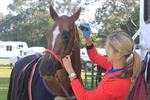Become an Expert in Animal Health
- Suitable for anyone wanting to work in animal health care.
- Increase your knowledge of animal health and animal disease, including more on natural health care.
- This course may provide a valuable foundation for working in animal refuges, zoos, pet services, farm production, or manufacturing/supply/marketing of animal care products or equipment.
- Start anytime, study at your own pace while working and gaining experience (whether in a paid or volunteer capacity); building your knowledge and skills for a successful business or career.
Duration: 600 hour course consisting of six 100 hour modules.
 Sample Course Notes - When Do Animals Become Stressed?
Sample Course Notes - When Do Animals Become Stressed?
Stress occurs as the result of our fight and flight response. Stress can be very useful to us. If you are about to be attacked by a predator, our stress response occurs and prepares our body to fight or run (fight or flight). Problems can occur in humans in terms of stress when we become stressed inappropriately and do not know what to do with that stress. For example, a business executive may have a hard and demanding job. They may become angry and annoyed frequently. Their body prepares to respond to that stress by fighting or running, but in the business environment, having a fight with someone who annoys you is not really a good idea, so he/she is not necessarily able to get rid of the body’s response to the stress. The body will respond to stress with an increased heart rate, increased blood pressure, increased blood flow to major muscles, etc. If a person has all this happening, but they are not able to release their stress, then it can cause damage to the person’s body in the long term. Chronic stress can cause increased risk of heart disease, reduced immune function, ulcers and decreased sex drive, among many other problems. It can affect our sleep patterns and increase our blood pressure. It can also affect our motivation.
Cortisol is the stress hormone in our bodies. It has been found to be increased in people who are suffering from depression. It also increases as we age, making it harder for us to control our own stress.
Stress can also occur in animals. If an animal is stressed, it is usually more alert than when it is not stressed, which can obviously be a good thing if they are at risk from predators, other life threatening events or in a new environment. Such an example can be reflected on yabbies (a type of freshwater crayfish) which are under great amount of stress during their moulting period, moment which contributes highly to susceptibility of injury, disease and predation. Although yabbies are able to tolerate a broad range of temperatures, as cold blooded species that they are, they are unable to control their body heat. The hormone responsible for inducing moult is activated at higher temperatures, which, in a way, can relate to higher stress periods if moulting stages occur that frequent.
Yerkes and Dodson developed the Yerkes-Dodson Law which looks at the relationship between arousal and performance. Performance will increase as cognitive arousal increases, BUT only to a certain point. If stress increases too much, their efficiency and performance will decline, so the animals response to a new situation may be reduced, which again could affect their survival chances.
Sapolsky studied baboons in their natural environment in the Serengeti, Africa. He collected blood samples from male baboons and looked at their rank, social affiliations and personality. He found that three factors affected the cortisol levels of the baboons – rank, perspective and friendships. Only males were studied as often the females were pregnant during the studies. He found that baboons who cultivated friendships and played with infants were more able to tell if a situation was a real threat and if they were able to win or lose had lower levels of cortisol.
Sapolsky also studied rats and found that the early experiences of the rats had strong and lasting effects on their behaviour. He found that when rats were placed in stressful situations at a young age, such as humans handling them, they adapted to the stress and were able to cope better to stress the more stressful situations they experienced. So basically, an animal will cope better with stressful situations if they learn to cope with stress well, and frequently from an early age.
Stress can be an important factor in an animal's health and well being. If you want to better manage animal health, it is important to understand stress and the impact it can have; along with many other things covered in this course.
Why Study This Course?
This course will:
- Provide you with a detailed and thorough knowledge of animal health and care.
- Improve your job and career prospects in animal health care.
- Expand your existing knowledge.
- Help you to specialise in animal health.
- Allow you to study online to fit around your other commitments.
- Enable you to learn with industry experts.
Any Questions?